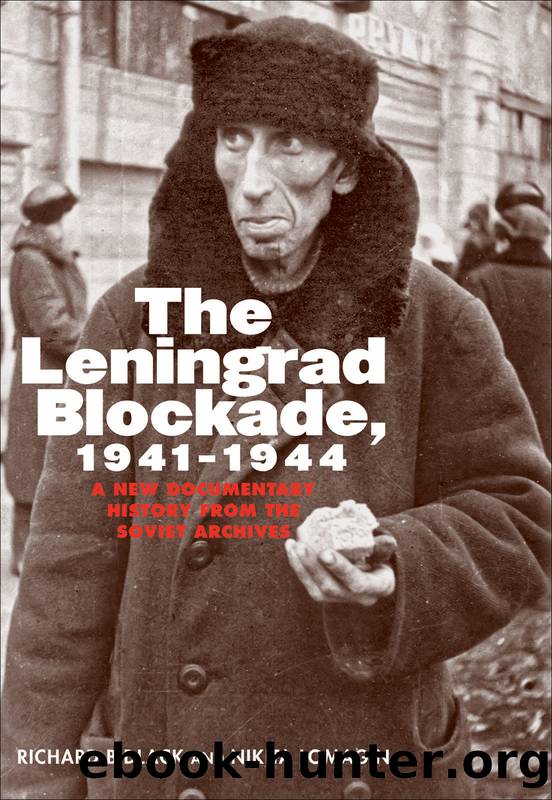The Leningrad Blockade, 1941-1944 by Richard Bidlack & Marian Schwartz

Author:Richard Bidlack & Marian Schwartz
Language: eng
Format: epub
Publisher: Yale University Press
Published: 2012-08-14T16:00:00+00:00
During the first year of the war, the party and the NKVD had to recruit thousands of secret informants and agents to replace those who were mobilized or evacuated, or who perished in the hungry winter or by enemy fire. Relatively little is known about how the party or the NKVD recruited informants and agents or the instructions they received. Undoubtedly, many volunteered their services out of patriotic or ideological conviction or in hopes of furthering their careers. The NKVD could also rely on methods honed in the 1930s to coerce people into service. It could threaten someone who had previously come under investigation to turn informant or face arrest, or it could offer lenient treatment to arrestees or convicts in return for their relatives becoming informants. Furthermore, Leningraders who had served time in labor camps or had been exiled often desired to return home after their release. The NKVD offered some of them residence permits in exchange for agreement to inform. The security organs could also offer inducements such as relocation to a better apartment or assistance in getting relatives evacuated from the city.
An important incentive that the NKVD could not offer in significant measure to prospective informants and agents during the siege was extra food. The NKVD was able to secure supplemental allotments for its operational staff members, but even so seventy-three of them starved to death in the first blockade winter. However, the NKVD could easily recruit informants in enterprises and institutions where food was relatively plentiful under threat of reassigning the recruits elsewhere if they refused to cooperate. Hospitals, for example, had relatively good food supply during the starvation winter (see below, p. 299), and the NKVD had many informants among their employees. The NKVD actively recruited informants in military hospitals in particular. The entire medical staff of one of the city’s largest military hospitals, No. 268, reportedly was required to eavesdrop on patients, as the NKVD went to great lengths to keep wounded soldiers from complaining to starving civilian relatives and vice versa. The fact that nurses and orderlies in this hospital received 400 grams of bread per day during the late autumn when most of the city subsisted on 125 grams and that they received special clothing, worked in heated rooms (while much of the rest of the city froze), and were exempt from the compulsory labor draft made them receptive to NKVD demands to become informants.
The NKVD and the party were also deeply concerned about the political mood among factory workers and people queuing in bread lines. At all costs, the authorities wanted to prevent bread riots and industrial strikes, the likes of which had engulfed Petrograd in 1917 and toppled Nicholas II and the Provisional Government in quick succession. The NKVD also had obvious security concerns in plants that manufactured munitions for the city’s defense and its eventual liberation from the blockade. As it turned out, the industrial strikes and attacks on food shops that did occur in the critical years of 1941 and 1942 were relatively small and isolated.
Download
This site does not store any files on its server. We only index and link to content provided by other sites. Please contact the content providers to delete copyright contents if any and email us, we'll remove relevant links or contents immediately.
| Africa | Americas |
| Arctic & Antarctica | Asia |
| Australia & Oceania | Europe |
| Middle East | Russia |
| United States | World |
| Ancient Civilizations | Military |
| Historical Study & Educational Resources |
Magic and Divination in Early Islam by Emilie Savage-Smith;(1533)
Papillon by Henry Charrière(1432)
Bohemians, Bootleggers, Flappers, and Swells: The Best of Early Vanity Fair by Bohemians Bootleggers Flappers & Swells- The Best of Early Vanity Fair (epub)(1409)
Ambition and Desire: The Dangerous Life of Josephine Bonaparte by Kate Williams(1389)
Twelve Caesars by Mary Beard(1315)
What Really Happened: The Death of Hitler by Robert J. Hutchinson(1163)
Operation Vengeance: The Astonishing Aerial Ambush That Changed World War II by Dan Hampton(1162)
London in the Twentieth Century by Jerry White(1147)
The Japanese by Christopher Harding(1133)
Time of the Magicians by Wolfram Eilenberger(1126)
Twilight of the Gods by Ian W. Toll(1120)
Lenin: A Biography by Robert Service(1076)
The Devil You Know by Charles M. Blow(1026)
A Social History of the Media by Peter Burke & Peter Burke(976)
Freemasons for Dummies by Hodapp Christopher;(965)
Napolean Hill Collection by Napoleon Hill(943)
Henry III by David Carpenter;(919)
The Rise and Triumph of the Modern Self by Unknown(913)
Richard III (The English Monarchs Series) by Charles Ross(908)
